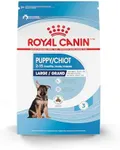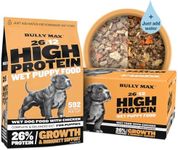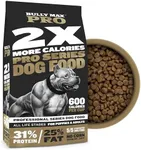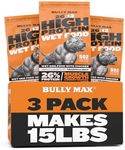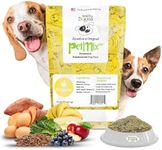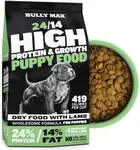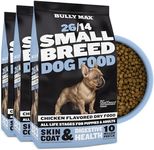Buying Guide for the Best Large Breed Puppy Foods
Choosing the right food for your large-breed puppy is crucial for their growth and overall health. Large-breed puppies have different nutritional needs compared to smaller breeds, and selecting the right food can help prevent health issues such as joint problems and obesity. When picking the best food for your large-breed puppy, consider the following key specifications to ensure you are providing the best nutrition for your furry friend.Protein ContentProtein is essential for the growth and development of your puppy's muscles and tissues. For large-breed puppies, a protein content of around 22-30% is ideal. Higher protein levels support muscle development, but too much can lead to excessive growth, which may strain developing joints. Look for high-quality protein sources like chicken, beef, or fish. If your puppy is very active, you might lean towards the higher end of the protein spectrum, while less active puppies may do well with moderate protein levels.
Calcium and Phosphorus LevelsCalcium and phosphorus are vital for bone development, but large-breed puppies need these minerals in the right balance to avoid skeletal issues. The ideal ratio of calcium to phosphorus is about 1.2:1. Too much calcium can cause bone abnormalities, while too little can lead to weak bones. Check the food label to ensure it meets the recommended levels. If your puppy is growing rapidly, it's even more important to monitor these levels closely.
Fat ContentFat provides energy and supports the absorption of fat-soluble vitamins. For large-breed puppies, a fat content of around 8-15% is suitable. Higher fat content can lead to rapid weight gain, which can stress developing joints. Choose a food with moderate fat levels to support steady growth. If your puppy is very active, you might opt for the higher end of the fat range, while less active puppies should stick to the lower end.
Kibble SizeKibble size is important for large-breed puppies as it encourages proper chewing and digestion. Larger kibble pieces can help prevent gulping and reduce the risk of bloat, a serious condition in large breeds. Look for foods specifically designed for large-breed puppies, as these will have appropriately sized kibble. If your puppy struggles with smaller kibble, it might be a sign to switch to a larger size.
Joint Support IngredientsLarge-breed puppies are prone to joint issues, so foods with added joint support ingredients like glucosamine and chondroitin can be beneficial. These ingredients help support healthy joint development and can prevent future problems. If your puppy is a breed known for joint issues, such as a German Shepherd or Labrador, choosing a food with these added supplements can be particularly important.
DigestibilityHighly digestible foods ensure that your puppy is absorbing the maximum amount of nutrients from their food. Look for foods with high-quality ingredients and minimal fillers like corn or soy. Ingredients like rice, oats, and sweet potatoes are good sources of digestible carbohydrates. If your puppy has a sensitive stomach or frequent digestive issues, prioritizing highly digestible food can help maintain their overall health.







